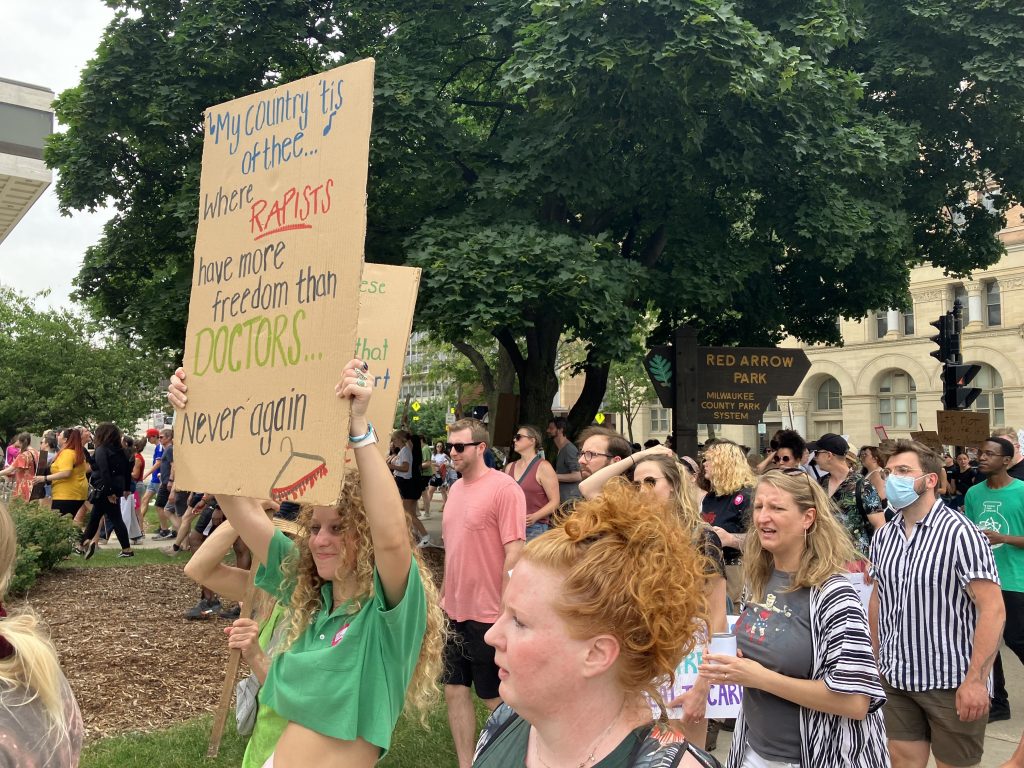Two Issues Show Decline Of Democracy In Wisconsin
Republican Legislature ignores huge majority of voters on abortion and redistricting.
Two of the most important issues in April’s election for Wisconsin Supreme Court were abortion and gerrymandering.
One year earlier, on June 24, 2022, the United States Supreme Court had overturned Roe v. Wade which had made abortions available in all 50 states. An 1849 Wisconsin law bans abortion except when the life of the mother is in danger.
Over the years, the Marquette Law School Poll has asked a sample of Wisconsin voters about each of these issues. For example, following the Dobbs decision, in which the US Supreme Court struck down Roe v. Wade, four surveys in late 2022 asked a total of more than 3,000 registered voters, “Do you favor or oppose the recent Supreme Court decision to overturn Roe versus Wade, thus striking down the 1973 decision that made abortion legal in all 50 states?”
As the next graph shows, about two-thirds of respondents with an opinion opposed overturning Roe. As the graph also shows, opposition was much stronger among women than among men, suggesting a willingness by some men to accept burdens so long as they fall on other people.
The next graph shows the same respondents divided according to their political party. Those who say they are independents but lean Democratic or Republican are counted with their preferred party.
It is worth noting that while a majority of Republicans supported overturning Roe and a majority of Democrats opposed it, support for maintaining Roe was much more universal among Democrats than was opposition to Roe among Republicans. Almost a third of Republicans reported that they opposed overturning Roe, while only 5% of Democrats support overturning Roe. When the preferences are totaled, about two thirds of respondents supported Roe, consistent with most other polls including those with national samples.
Starting in 2012, the Marquette poll asked a four-part question: do you think abortion should be legal in all cases, legal in most cases, illegal in most cases, or illegal in all cases?” This question was included in thirteen surveys for a total of almost ten thousand respondents.
Although respondents in the two middle groups were not asked to specify what cases would qualify as exceptions, adding the first two groups together—those saying abortion should be illegal in all or most or all cases—adds up to 37%, virtually the same as the number supporting overturning Roe. Similarly the fraction opposing the overturning of Roe is 63%.
Regarding gerrymandering, the question of who should be responsible for redistricting legislative districts has been included in the Marquette Poll. Once each year between 2019 and 2021 the poll has asked: “As you may know, redistricting involves redrawing maps of legislative districts for the state legislature and for Congress. In your opinion, who should be responsible for drawing legislative districts — the state legislature and governor or a non-partisan commission?”
The next graph shows the total responses over the three times this question was asked. Democrats, independents and Republicans all agreed that a non-partisan commission is preferable to the Legislature and governor drawing districts.
The three Wisconsin justices who opposed the “least- change” rule advocated that a panel of federal judges be asked to take responsibility for redistricting, similar to past practice when the governor and legislators could not agree on a district map. Sharing the poll respondents’ view that drafters of the new map should not have a personal stake in the outcome, the dissenting justices argued that this would minimize conflict of interest, especially because federal judges are appointed for life.
In a healthy democracy, if there is a misalignment between the wishes of a majority of the voters and government policy, elections offer a fix. It is clear from Marquette’s polling that a mismatch exists between what a majority of Wisconsin voters want and state government policy.
In Wisconsin, a clear majority of voters want the redistricting process taken out of partisan politics. Republicans who dominate the Legislature, by contrast, want legislative districts that will assure their continued dominance under any likely scenario for voting.
Why hasn’t the Wisconsin democracy worked the way it should? The main cause, I would argue, is the gerrymander itself. Legislation to correct the gerrymander must somehow pass the state Legislature. The problem is that the majority of the members are beneficiaries of the gerrymander.
Strategies to bypass the stranglehold of the Legislature and its gerrymander are hard to see. The governor can propose reforms and veto legislation that would make things worse. But the Legislature would likely declare any meaningful reform as “dead on arrival.”
One solution enjoyed by citizens of some other states is not available in Wisconsin. Despite Wisconsin being the heart of the Progressive movement early in the 20th century, the state did not pass reforms that would allow citizens to initiate legislation that would then be considered at the next election.
The next graph compares voting for governor in November of 2022 with the 2023 Wisconsin Supreme Court election. The blue dots represent each Assembly district’s vote percentage vote for Tony Evers (on the horizontal axis) and the district’s percentage vote for Janet Protasiewicz (on the vertical).
Not surprisingly, as the percent of the two major party vote that went for Evers increases, so does the percentage for Protasiewicz. The impression that the nominally nonpartisan Supreme Court election has become a partisan one is supported by the evidence. This is confirmed by the linear trend line, shown as a dotted blue line.
Note that, with the exception of three of the 99 Assembly districts, Protasiewicz received a higher proportion of each district’s votes than did Evers.
Polling shows that a strong majority of people who usually vote Republican support non-partisan redistricting. Failed candidate Daniel Kelly made it very clear that the Wisconsin gerrymander favoring Republicans would be safe with him on the court. He lost. A significant minority of Republican voters oppose government abortion bans. Kelly’s past employment with anti-abortion groups suggests where he would stand if asked to rule on Wisconsin’s law banning abortion.
Republican party intransigence on abortions and gerrymandering may help account for Protasiewicz’s ability to increase support in Republican districts. The party that likes to describe itself as the party of freedom is increasingly the party of autocracy.
Data Wonk
-
The Imperial Legislature Is Shot Down
 Jul 10th, 2024 by Bruce Thompson
Jul 10th, 2024 by Bruce Thompson
-
Counting the Lies By Trump
 Jul 3rd, 2024 by Bruce Thompson
Jul 3rd, 2024 by Bruce Thompson
-
How Did Politics Affect Covid Deaths?
 Jun 26th, 2024 by Bruce Thompson
Jun 26th, 2024 by Bruce Thompson


























We see these same spreads across all the issues. GOP gerrymandering ensures this deficit in representation remains this way. The only way for them to win is to cheat.